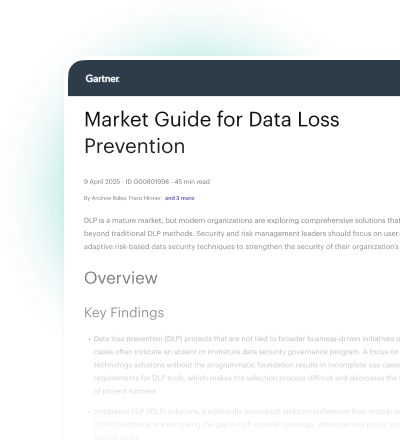What is Secure Web Gateway Software?
Secure Web Gateway (SWG) software is a security solution that prevents unwanted web traffic from entering an organization’s network and blocks employees from accessing suspicious sites or downloading malicious content.

Secure Web Gateway Software Explained
Sitting between users and the Internet, secure web gateway software inspects web traffic moving in or out of a network and enforces security policies to block malware, Internet-borne viruses, malicious web traffic, websites with vulnerabilities, weaponized downloads and other cyber threats.
Secure web gateway software may be installed on-premises via a web security appliance or accessed as a cloud-based service. Along with cloud access security brokers (CASBs) and Zero Trust Network Access (ZTNA) solutions, secure web gateway software is a core technology for the Secure Access Service Edge (SASE) approach to cybersecurity.
The Need for SWG Software
The need for a web security gateway is the result of fundamental changes in IT environments and the increasing sophistication of cyber threats. The traditional network perimeter has all but disappeared as businesses have embraced cloud computing, SaaS applications, remote workforces and BYOD. To increase productivity, organizations must ensure that remote workers have fast and secure access to cloud services from anywhere, on any device, even on unsecured connections.
Legacy network security infrastructure was simply not designed to deliver adequate protection for this type of IT ecosystem. Traditional technology typically lacks the ability to scale at the speed required for organizations to remain competitive. Many legacy systems require traffic to be backhauled to on-premises hardware where it can be inspected and where security policies can be enforced. But with highly distributed IT environments and workforces, this results in poor performance, bandwidth restrictions and unacceptable user experiences.
In contrast, secure web gateway software can run anywhere, helping to better protect the remote workforce. Using a secure web gateway enables an organization to provide employees with secure connections to the IT resources and cloud services they need, even when the organization lacks direct control over an employee’s device or connection.
Components of a Secure Web Gateway
Secure web gateway software uses a variety of tools to provide a comprehensive web security solution.
- URL filtering. To prevent employees from unknowingly visiting malicious websites or applications, secure web gateway software provides security teams with granular control over the types of websites that users can access. URL filtering capabilities enforce security policies that prevent users from accessing sites known to be malicious as well as new URLs that are suspicious.
- Anti-malware scanning. SWG software scans web traffic to search for known malware signatures and files that resemble those threats.
- Application control. SWGs also enforces policies that prevent users from accessing sites deemed inappropriate or unacceptable, such as social media, YouTube, adult content sites or sites on the dark web.
- Data loss prevention (DLP). By monitoring outbound web traffic, secure web gateway software can prevent leaks of sensitive data like credit card information, intellectual property, customer data, personal health information, trade secrets and other confidential material.
- Encrypted traffic analysis. Secure web gateway software scans and secures SSL-encrypted traffic and compares it to local and global threat lists and reputation sources to determine if the content represents a threat to the network.
- Antivirus. SWGs use real-time virus signatures to block threats like viruses, Trojans and adware.
Benefits of Secure Web Gateway Software
With a secure web gateway service or software, organizations can:
- Block users from downloading malware, visiting malicious sites or accessing spoofed sites that attempt to dupe users into revealing login credentials and personal information.
- Prevent malware within the IT network from communicating with attackers.
- Consistently enforce security policies throughout a distributed IT environment.
- Enable users to securely connect to cloud services and corporate resources from anywhere using their personal devices.
- Uncover threats that have evaded detection by firewalls or other stream-based solutions.
- Monitor encrypted traffic to ensure there are no threats hidden by encryption.
- Prevent malicious and inadvertent data leaks.
- Provide IT teams with greater visibility into how employees are using the web.
- Simplify compliance by enforcing policies that conform with regulatory requirements.
Secure Web Gateway Software from Forcepoint
As a leader among secure web gateway vendors, Forcepoint offers secure web gateway software as part of Forcepoint ONE, an all-in-one, cloud-native security platform. With Forcepoint’s SWG software, users can securely access any website or download any document while enjoying the high-speed performance they need to stay productive. Forcepoint ONE SWG monitors and controls any interaction with any website, blocking access to websites based on category and risk score or blocking downloads of malware or uploads of sensitive data to personal filesharing accounts.
With Forcepoint ONE SWG, organizations can:
- Ensure high availability thanks to 99.99% verified uptime since 2015.
- Minimize latency and maximize throughput with auto scaling, a distributed SWG architecture and over 300 points of presence.
- Reduce repetitive and redundant configuration management with a unified administrative console.
- Simplify deployment with unified managed device agents for SWG, CASB and ZTNA.
- Accelerate user onboarding with SCIM provisioning.
- Block malware and data exfiltration with data-in-motion scanning. Enable safe use of unknown websites or downloaded files with optional Remote Browser Isolation and Content Disarm & Reconstruction.
- Control access down to the URL directory level.
Related
The Painless Guide to Security Service Edge (SSE)
Ler o Livro EletrônicoForcepoint ONE Web Security
Ler o Resumo da SoluçãoDemo: Forcepoint SWG
Assistir ao Vídeo







